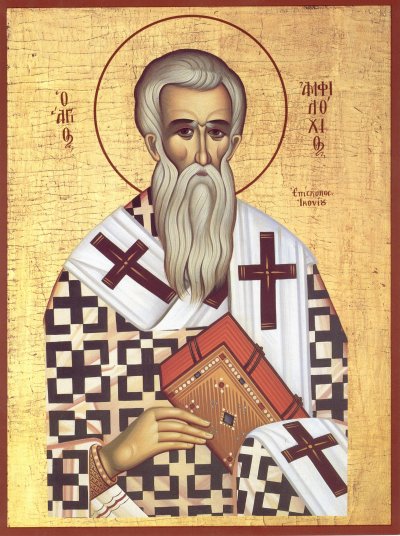
Icon of St. Amphilochius, provenance unknown.
Concerning the Canon of the Holy Bible according to
"St. Amphilochius lived during the reigns of the Emperors Valentinian and Valens, in A.D. 374, and he shone in asceticism and divine knowledge. He became Bishop of Iconium. And he also served as a defender of the divinity of the Son and of the Holy Spirit. For he was present at the holy Second Ecumenical Council, being one of the hundred and fifty Fathers attending it, and fighting against Macedonius the Pneumatomach (i.e., opponent of the Spirit) and the remnants of Arius. In the comic drama which he employed with effect upon the Emperor Theodosius the Great, whom he approved, and upon his son Arcadius, who had been newly ordained Emperor, and whom he disapproved, according to Theodoret or according to Sozomen, by saying to his son, “Rejoice, O Son,” and at the same time shaking his finger at him, he persuaded the said Emperor to adopt a law that thenceforth heretics, including Arians and Macedonians, should not be allowed to hold any councils, nor to engage in any debates concerning the essence and nature of God, and that whoever should violate that law should be punished. When this Saint asked a question, Basil the Great replied to him by sending him the twenty-seven chapters concerning the Holy Spirit." (Rudder, p. 885)

Icon of St. Amphilochius, provenance unknown.
“Nevertheless, there is another thing you ought to learn
“More than anything else. That not every book is safe,
“Though possessing the venerable name of Scripture.
“For there are, there are indeed at times books
“With a false title. some of them being middle ground and,
“So to speak, neighbors bordering upon the word of truth.
“Others again are spurious and exceeding misleading,
“Like decorations hung on the breast and counterfeit coins
“Which bear the inscription of the Emperor, true enough,
“But which are proved to be counterfeit by their materials.
“Since thou hast the grace to ask which books are God-inspired,
“Thus shalt thou learn clearly each book in order.
“I will tell thee those of the Old Testament:
“The Pentateuch, comprising Genesis, or Creation, then Exodus,
“And containing the Book of Leviticus in the middle;
“After which come Numbers, and then The Second Book of Laws.
“Add to these Joshua and the Judges.
“Afterwards Ruth and the four books of the Kings.
“Following these come at least the two books of Chronicles.
“Next thereafter the first and the second of Ezra.
“Next I will tell thee five poetical books.
“That of Job, who was crowned with achievements, suffering much,
“The Book of Psalms, full of songs to benefit souls;
“Three books of Solomon the Wise, comprising Proverbs,
“Ecclesiastes, and another the Song of Songs.
“Right now to these Prophets add the twelve I name:
“Hosea first, then Amos second,
“Micah, Joel, Obadiah, and the type
“Of the three days’ passion called Jonah;
“Nahum, and after him Habakkuk; then the ninth
“Zephaniah; and nextly Haggai and Zechariah;
“And finally the angel of two names Malachi.
“After whom thou shalt learn the four great Prophets,
“Namely, Isaiah the great speaker who speaks out boldly,
“Jeremiah, who is sympathetic and mystical,
“Ezekiel; and last of all of them Daniel,
“The same who is wisest in deeds and words.
“In addition to these some approve of Esther.
“Of the New Testament now let me tell thee the books.
“Accept only four Evangelists, and none other ones;
“Namely: Matthew, then Mark, and third after these Luke,
“Count close, take time, and add to these three
“As the fourth one John, but first in sublimity of dogmas;
“For I naturally and fitly call him a son of thunder,
“Who in speech has sounded loudest and greatest to God.
“But accept also the second book of Luke, namely,
“That of the catholic Acts of the Apostles.
“Thereupon add the ‘chosen vessel,’
“The preacher and Apostle to the heathen nations,
“Paul, who wrote wisely to the Churches
“Twice seven Epistles, and to the Romans one.
“To the latter one must conjoin two to the Corinthians,
“That to the Galatians, and that to the Ephesians;
“After which that to the Philippians, that written
“To the Colossians, two to the Thessalonians,
“And one each to Timothy, Titus, and Philemon;
“Besides which the one wrongly called spurious
“To the Hebrews, for the grace of it is genuine.
“Well. What about the Epistles Catholic?
“Some say there are seven of them, and some only three.
“We must accept that of James as one;
“That of Peter as one, of those of John one,
“Though some say the three of them, and in addition thereto
“They accept the two of Peter; and that of Jude as the seventh.
“As for the Book of Revelation of John again,
“Some approve it, but at least a majority call it spurious.
“This should be a most truthful canon of the God-inspired Scriptures.”
(Rudder, pp. 885-886)